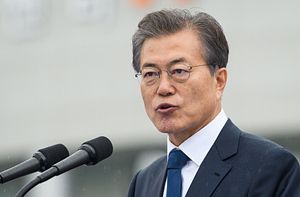In the press conference on January 9, South Korean Foreign Minister Kang Kyung-wha said her government will not seek the renegotiation of the December 2015 agreement it reached with Japan regarding the comfort women issue. Her official announcement ended months of speculation on whether President Moon Jae-in, who has been openly critical of the agreement since he was a presidential candidate, would push for the revision or renegotiation of the deal that his predecessor Park Geun-hye reached two years ago.
The speculation has particularly intensified since December 27, 2017 when the Special Task Force, an independent investigative group appointed by Moon Jae-in to look into the 2015 deal, announced its findings. The Task Force concluded that the 2015 agreement was flawed, criticizing the South Korean government for (among other things) not conducting direct hearings with the “comfort women” survivors.
The Task Force’s proposal, as well as Moon’s statement that the deal was “seriously flawed” and therefore could not resolve the dispute over the “comfort women,” invited a strong reaction from Tokyo. Japanese Foreign Minister Taro Kono, following the Special Task Force’s announcement, promptly issued a statement in which he included a stern warning to Seoul that if it attempted to revise or renegotiate the 2015 agreement, the fallout for Japan-South Korea relations would be “unmanageable.”
The “comfort woman” issue — referring to the women who were mobilized by the Japanese authorities (or those who claimed to be acting on behalf of the Japanese authorities) for sexual slavery during World War II— has long been the thorniest issue in Japan-South Korea relations. The Japanese government’s earlier effort to resolve the issue took place in the 1990s. The effort comprised of: (1) the 1993 statement by then Chief Cabinet Secretary Yohei Kono (the father of the current foreign minister, Taro Kono) that acknowledged the involvement of Imperial Japanese Army in the establishment of “comfort women” stations; (2) the 1995 statement by then Prime Minister Tomiichi Murayama, in which he expressed his “heartfelt apology” for Japan’s wartime atrocities; and (3) the establishment of the Asian Women’s Fund to carry out the Atonement Project, which included health care assistance and financial compensation for “comfort women.”
However, this earlier attempt by Tokyo was deemed insufficient both by the South Korean government and “comfort women” survivors primarily because they regarded the Asian Women’s Fund as an “unofficial” entity. Although the Fund was established by the Japanese government, the projects were funded through private donations collected from Japanese people. Seoul and the victims continued to push Japan for a compensation scheme that could be considered an official response from the Japanese government.
Since then, the issue has flared up repeatedly between the two countries, particularly after civic groups began to set up statues of a girl that supposedly symbolized “comfort women.” One such statue was erected in front of the Japanese Embassy in Seoul in 2011. The “comfort women” statues have since spread beyond South Korea to the United States, Australia, and some countries in Europe, adding to the tension between the Japanese and the South Korean governments.
The December 2015 agreement was intended to end what seemed as an endless negative spiral, in which the South Korean government continues to demand the Japanese government demonstrate its atonement, while Tokyo questions whether Seoul would ever be satisfied. Under this agreement, the Japanese government made a one-time lump sum contribution to a foundation established by the South Korean government that would carry out projects to tend to the needs of the “comfort women” survivors. More importantly, Tokyo and Seoul also confirmed that the steady implementation of this agreement would represent the “final and irreversible” resolution to this issue. Despite criticism both in Japan and South Korea, this agreement was deemed to be the best compromise that would allow Tokyo and Seoul to finally lay the issue to rest and move on to discuss the more urgent challenges that the two countries share — such as how the two countries can effectively work with the United States to deter North Korea from further provocation.
The Moon administration’s decision to stand by the December 2015 agreement prevented the worst. Indeed, as Kono warned, any request for the revision of the agreement from Seoul could have damaged Japan-South Korea relations beyond repair, as it would have completely shattered Tokyo’s confidence in Seoul to honor any agreement beyond one administration. At minimum, Tuesday’s announcement ensured the survival of the agreement.
Still, damage may have been already done. In particular, by publicly insisting the need for additional measures, the South Korean government might have further toughened the Japanese government’s already hardened position, thus making any dialogue on this issue in the future impossible. The December 2015 agreement stipulates that “projects for recovering the honor and dignity and healing the psychological wounds of all former comfort women be carried out under the cooperation between the Government of Japan and the Government of the ROK.” In other words, Japan may have been open to discussing additional measures if such a dialogue took place in the context of better implementation of the agreement. However, now that Seoul has openly called on Tokyo to keep making further efforts, the Japanese government will be far less inclined to have any further discussion on this issue.
Such a hardened Japanese position is reflected in the comments from Kono on January 9, reiterating that there is “no change” in Japanese government’s position that the steady implementation of the December 2015 agreement constitutes “final and irreversible” settlement of the issue.
By following up on campaign promises, Moon might have been successful in appealing to his domestic support base. Given the continuing tension on the Korean peninsula, however, it’s fair to ask: Aat what cost?”

































